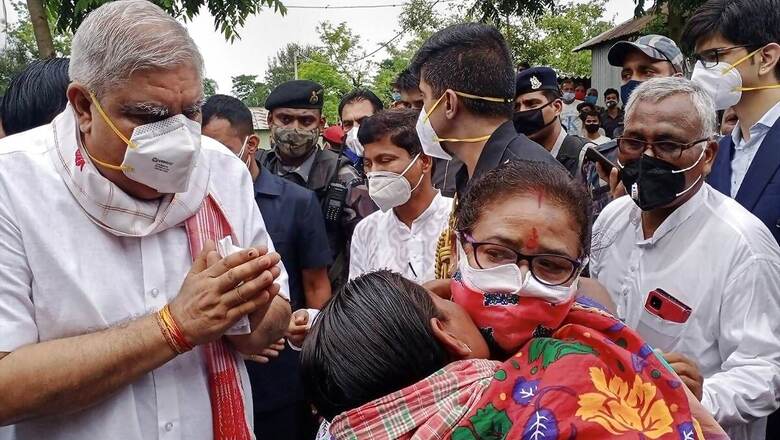
views
The recent spate of political violence in West Bengal after election results were declared has brought many crucial issues to the fore. Amongst these, one of the key issues is politicisation of the administrative apparatus as the Governor of West Bengal Jagdeep Dhankar expressed deep concern and anguish at the reactions of the state administration.
In his address to the new assembly, the Governor of West Bengal said, “I don’t see any sense of responsibility or accountability. On May 3, I directed the DGP and CP, Kolkata to give reports to me about the status in their areas. On that very day, I summoned Additional Chief Secretary (Home) to give me an update on two counts- the current state of affairs and the steps taken in public domain to contain such a menace and what plan they have for coming days to control this menace. No report came forward.”
“Why ACS (Home) failed to do the lawful duty of giving me an update…indicates the steps taken. Their visit was only to mark attendance. Just optics. If this is the state of affairs…, you can imagine what kind of lack of accountability we are witnessing in the state.”
“I urge all of you, media in particular, since this is the most unprecedented post-poll violence in a very sensitive state, which has taken sinister dimensions resulting in deaths, rapes, indignities and the worst part is candidates of opposition, booth workers of opposition, voters of opposition are being made to pay price with their life and rights in the largest democracy. That can neither be overlooked by me …,” the Governor said.
He further added, “I therefore strongly urge the government, first you update me comprehensively on the state of affairs. May 2 onwards, not a word has been indicated to the constitutional head in spite of my sustained efforts. What I see right here on the wall, Constitution is not working here. It is extremely difficult for me to hold, that governance in the state of West Bengal is in accordance with constitutional parameters. The working indicates shaming of democracy, I only hope and pray that the government…. will realise the ground reality and do all it can, and it should, to contain this alarming scenario.”
The National Human Rights Commission (NHRC) referred to this political violence as a fit case of alleged violation of right to life of the innocent citizens. It observed that the district administration and local law and order enforcement agencies appeared not to have acted to stop such violation of human rights of the affected persons.
The Commission took suo-motu cognizance of the matter and has requested its DIG (Investigation) to conduct an on-the-spot fact finding investigation and to submit a report at the earliest.
The National Commission for Women (NCW) claimed that the women targeted in post-poll violence told its fact-finding team led by Chairperson Rekha Sharma that they want to “leave the state” and that the police was not taking effective steps. Sharma was in Bengal for two days and said the NCW team had talked to many women who were worried about the safety of their daughters. The team also met Governor Dhankar. It was decided that a district-wise compilation of all the complaints should be made.
Sharma gave this information on May 7, 2021 to the media that the aggrieved women did not even want to raise their voice about the atrocities because they were afraid of the repercussions.
Incidentally, the two states which have witnessed significant political violence as compared to any other Indian state are Kerala and West Bengal. The roots of these violence can be traced to the domination of the Left in the political space in these two states.
In West Bengal, the use of political violence became an accepted abnormality of the state politics during the Left Front’s rule from 1977 to 2011. After Trinamool Congress (TMC) came to power in 2011, this trend has continued. It is time to break this chain and due to the deformities that have crept in the state politics of West Bengal, the onus is on the administrative apparatus to check political violence. But for this to happen, there is an urgent need for its depoliticisation. If West Bengal’s bureaucracy can meet this challenge successfully, it can be replicated across the country in different states as there is hardly a state left where the administration has not been politicised, only the extent differs from state to state.




















Comments
0 comment